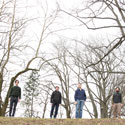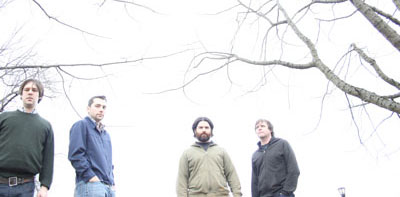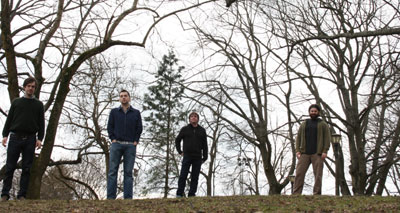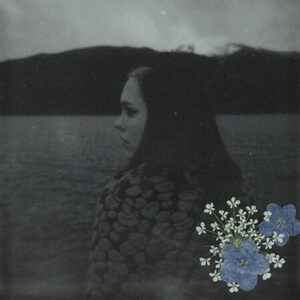
pacific UV
You Made Me Realize
Matthew Moyer
Portland space-cases pacific UV have been cloying ears with their meditative mono-chord goodness since the release of their debut album longplay 1 back in 2002. Since then, they’ve been restlessly honing their sound into something beyond shoegazing, something altogether more baroque, prayerful, gentle, and lush. The aptly-named longplay 2, three years in the making and based on Tom McCarthy’s surrealist headfuck novel Remainder, was just what Ink 19 needed to hear. This time they almost completely ditch guitars for piano, synths, and varied burbles and bleeps, as well as a gorgeous palette of willowy male and female voices. File this one next to Spacemen 3’s Playing With Fire, Mazzy Star’s Among My Swan, Gregor Samsa’s Rest and the likes of Mojave 3 and This Mortal Coil. Ink 19 was happy to speak with main man Clay Jordan about their newest album, which we’re over the fucking moon about. But don’t go getting attached to this sound. Membership shuffles and a restless (and surprising) desire to strip their sound down to more raw and minimalist elements make this a portrait of a young band in flux. Let’s get sundazed.
• •

Tell me a little about the history of the band and how your sound and membership has changed over time. The pacific UV sound has really expanded in terms of emotion and the overall sonic palette since the first record. Some of the songs on longplay 2 almost sound like film music.
We started in Athens, Georgia around 1999. I moved there right after college. I fell in love with the town. Neutral Milk Hotel and Olivia Tremor Control were still playing back then – it was a very inspiring time to be a musician in Athens.
I formed the band with a childhood friend, and we went into the studio and spent two years making a record before we ever played live! Luckily, the record was well-received and we got signed immediately. We then toured the country twice and were ready to record a follow-up, but got all our gear stolen at CMJ in NYC and this kind of took the wind out of our sails. After that, we recorded an EP, but the guy I formed the band with was tired of the lifestyle and went to medical school. I moved to Portland, Oregon and continued the band.
It is difficult for me to compare this record with the first one. When you are making something over such a long period of time, you lose perspective on it. The songs on the new record sound a bit more refined, but I honestly don’t know. There is a progression going on, but not as much of one as I hoped for. I want the third LP to be more experimental and diverse, I feel at this point we are pigeonholed as an ambient band, but there are so many other types of music I love and want to experiment with.
Where are you based? Does your location affect your creativity in any way?
We are based out of PDX (Portland) Oregon. The rain does not help when we try to write more upbeat songs…
Do you consider droning/repetitive music more satisfying and heartstring-tearing? I kind of love it how on so many of your songs, I’m like, “God I wish this part would go on just a little longer” – and then it does! Music like yours just seems to affect me on a much more basic level than other music. It’s pure feeling. What brought you to this more spacey, organic music?
Drone music allows for a greater degree of contemplation and reflection, I think. If done well, it is almost like it induces a type of meditation where 30 minutes can go by in a matter of seconds… Whether this is a more “emotional” type of music is really a subjective thing up to the listener.
I love repetition and the idea that within a repeated phrase it can vary each time it is played. So even though you are hearing the same phrase over and over again, each one is unique in that it is played a little bit differently than all the other ones (kind of the “each snowflake is unique” idea). Minimalism can seem overly simplistic, but if one listens closely, there is infinite variation within each phrase.
I can relate to that feeling of wishing certain parts of songs would go on longer… though sometimes I will listen to a song over and over because there is just one part I want to hear and it happens so quickly that I will listen to it again just for that part.
What was the recording process like for longplay 2? Are songs pieced together layer by layer, or is it kept as live as possible?
All these songs are rough sketches when we enter the studio… we try to record the initial tracks as live as possible… and then we go to our home studio and lay down layer after layer of overdubs… often the end result sounds nothing like what we initially recorded…
When, in the process of writing a song like “Tremolo,” does the consideration to bring in guest musicians or use new instruments come in? How do you approach potential collaborators? There are so much more piano and organ and strings on this album…
It was not intentional. Maybe the fact that we have a keyboardist who loves to play piano rather than synth. This record was recorded with no restrictions, which is one reason it took so fucking long. I like the idea of having restrictions for the next one, and maybe one could be “No guitars on this record,” etc.
Collaborators are always an afterthought. Though I would gladly write a song with Brian Eno or Jason Pierce (Spiritualized, Spacemen 3) in mind if I knew they would record it with us!
Would you walk me through the process of composition for a song like “Alarmist” or “Something Told Us?” I’m interested in the basic building blocks you start with, only to end up with this wall of crystal sound.
Actually these are the two songs on the record that were written by our former guitarist Kevin Davis – who now has his own solo project called Glowworm.
These two came in fully formed, but we expanded and added sections to them. The mid-sections of each song are what Kevin wrote… We added the intros and outros of each song. Because many of the songs are quite simple, the hard part is coming up with a riff/structure that we feel can be repeated without getting tiresome. We then embellish around that basic riff. Frankly, that is getting a bit tiresome and I think the new record will be more upbeat, with more changes and chords.

What music were you listening to or what books were you reading while making longplay 2?
Sam Cooke, Miles Davis, Auteurs, House of Love, Patsy Cline…
Remainder by Tom McCarthy… longplay2 is an audio representation of this book and inspired the entire record. Read it now if you haven’t. It is quite astonishing.
What is your earliest memory of music?
Listening to The Smiths’ “Louder Than Bombs” for the first time in a Wendy’s parking lot while my family was inside eating. That sounds banal, but it was a life-changing moment.
Tell me about how you tour music like this? Do you strip down the arrangements to, like, Galaxie 500-style minimalism, or do you make it louder and rawer?
We are opting for the louder/rawer approach. So many of our songs are slow, we hope we can keep people awake by raising the volume.
Did you put the running order of the album together consciously? I like how it starts off huge and cinematic and builds and builds to “Orson” and then ends with this sort of pocket lullaby.
We are very particular about the running order and always try about ten variations before we settle on one we like. However, since the record was based on the book Remainder we kind of knew how the songs would flow…
What are you working on now? Any plans for the immediate future?
We are in the process of shooting a few videos – one in PDX and one in LA. We are also planning a West Coast tour for this fall…
• •
Warm Electronic Recordings: http://www.thewarmsupercomputer.com ◼












